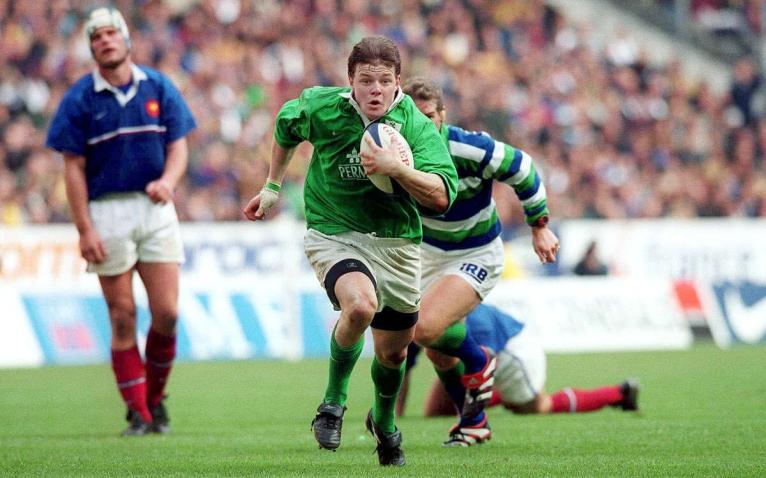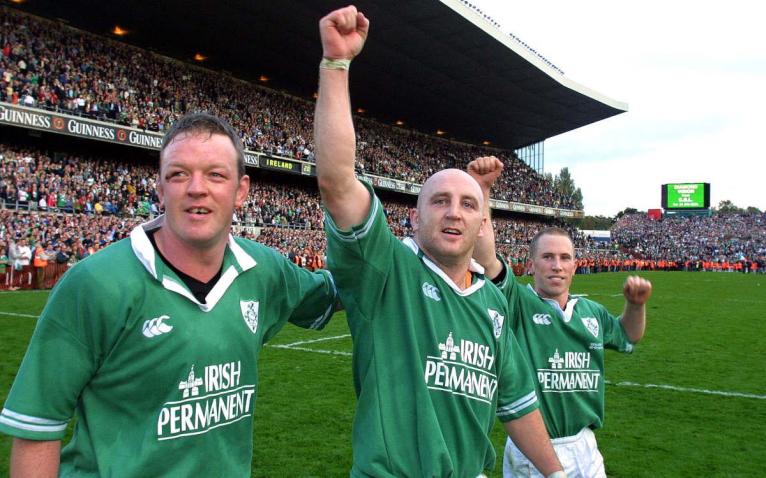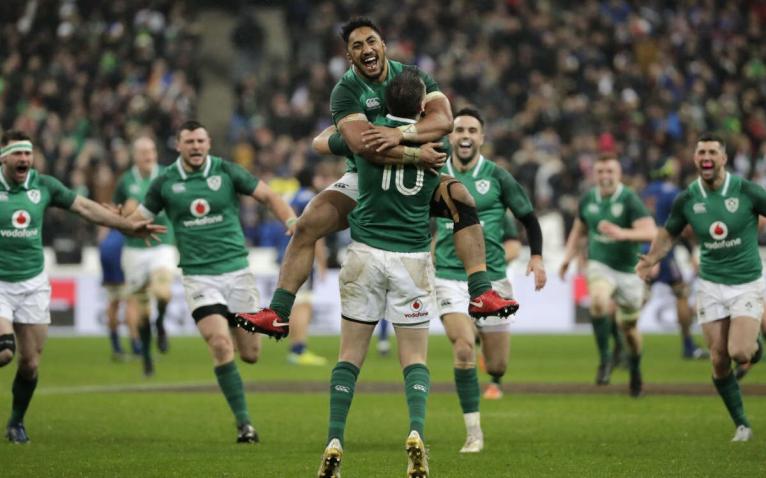The old joke was rolled out every couple of years. Spring would be in the air, Ireland would be in France, the game would turn into a massacre and the comedians would be in full voice. ‘Oscar Wilde wasn’t the only Irishman buried in Paris,’ they’d say and everyone would laugh.
That was Irish rugby, the butt of bad jokes. From 1952 to 1998, Ireland beat France only once in their capital. Coaches didn’t pin a team sheet to the dressing room wall, more a plea for help. It was desperate. Irish rugby was desperate, self-respect non-existent.
“I remember Warren (Gatland) bringing a sports psychologist in to speak to the team before the 1999 World Cup,” Kieran Dawson, the former Ireland flanker, said. “He bluntly asked us: ‘who here expects to win the World Cup’? Keith Wood was the only one to put his hand up. The feeling in the room was, ‘Keith’s only doing that because he knows it’s the right thing to do’.
“But by the end of the 2000 Six Nations, you could definitely sense something had changed. Put it this way, when we got to Paris (for the fourth game of that year’s championship), we’d a new mentality. The feeling that day was, ‘why should we lose’?”
To the outside world, the answer was blindingly obvious. All Ireland did back then was lose, collecting eight wooden spoons in the 20 years leading up to that 2000 season; in contrast to the two Grand Slams, four championship titles and six Triple Crowns they’ve won since. Today, Irish rugby – save for its allergy to World Cups – is held in high regard; Leinster being serial podium visitors; the national team having posted more top-half finishes in the Six Nations this century than any of their rivals.
But 23 years ago, they were an embarrassment, winning just 12 of their previous 56 games in the Five Nations, scoring just three tries in the 1999 championship.

As the fireworks screamed into the night sky to signal the turn of the century, you’d have had to conduct a serious search to find anyone who could have predicted the turnaround that was just weeks away from unfolding. Warren Gatland, their young Kiwi coach, had overseen a disastrous defeat to Argentina in the 1999 World Cup, following on from his record of one win in seven Five Nations games.
But things were changing. Youngsters Shane Horgan, Simon Easterby, John Hayes, Ronan O’Gara and Peter Stringer were handed debuts in that year’s championship against Scotland, the first of 361 caps they’d collectively win for Ireland; exiled players, Anthony Foley and Denis Hickie came back. And in Paris this 21-year-old called Brian O’Driscoll came of age as Ireland won 27-25.
This was the day everything changed, when Ireland ceased to be the joke team of Europe and instead became genuine contenders. They’ve stayed that way since.
“The Heineken Cup and our province’s success in it changed things,” says Hayes, the former tighthead. “We were no longer looking at French players as some kind of supermen who you played against once a year. I’d say the lads from the 1980s Irish teams would have loved to have got a crack at Serge Blanco at Biarritz rather than just seeing him every second year in a French jersey in Paris. The Heineken Cup put an end to the French mystique.”
Brian O’Driscoll had no fear. He’d this self-belief, this happy-go-lucky way about him. Some players, the older they get the worse they get, they overthink it more. That side didn’t.
Warren Gatland on that win in 2000
So did O’Driscoll. “Until that 2000 season, we were kind of like Crystal Palace playing Manchester United,” says former Ireland lock Paddy Johns. “Going up against France, England, South Africa, Australia or New Zealand – we believed we could beat them but we also knew we had to get straight into it, put teams off their stride.”
Gatland remembers going close two years earlier in Paris as well as David Humphreys missing a kick to win it in the dying moments of the 1999 game. Come 2000, he knew they were ready.
“Brian O’Driscoll had no fear,” Gatland said. “He’d this self-belief, this happy-go-lucky way about him. Some players, the older they get the worse they get, they overthink it more. That side didn’t.”
This is Hayes. “Experience sometimes can be a bad thing. So if all you knew about Paris was getting the shit kicked out of you, then we might have been better off going with a group of young fellas who had a bit of enthusiasm about us. It wasn’t just Brian who had no fear of France. None of the new lads did. We’d no baggage, no history of defeats.”
Eddie O’Sullivan was Gatland’s right-hand-man in 2000 and knew Ireland had a reputation for running out of steam. So the game-plan was changed that year, everything now based around getting quick ball off the set-piece, getting these new, exciting backs to attack space. O’Driscoll was unstoppable under the Parisian sun in March 2000, scoring three tries.

Ireland won, their first victory in Paris since 1972, the first of a series of breakthrough wins. They kept on coming. They beat England in 2001 for the first time in seven years, Australia in 2002 for the first time in 23; South Africa in ‘04 for the first time in 39 seasons; the 2009 grand slam was their first since 1948; New Zealand were finally conquered after 111 years of trying in 2016, an inaugural away win came in South Africa that same year, and that’s before we mention the series wins over Australia (2018) and New Zealand (2022).
But if you could choose one team that has always been there in the seminal moments of this Irish story, you’d opt for France.
Paris in 2000 was where O’Driscoll became Bod; France in 2009 was the launchpad of that year’s Grand Slam, an unforgettable win in Croke Park that set the tone for the season. And Paris was where Ireland sealed their next championship in 2014, O’Driscoll’s farewell game, the Stade de France also the venue when Johnny Sexton landed that kick in February 2018.
We all know what happened when time ticked on to 82.37, 41 phases in, 45 metres out. Even when surrounded by his teammates, Sexton was separate from them, dropping into the pocket, eyes fixed on the ball, focusing on the task.
The clock said 80 minutes and 50 seconds; the scoreboard said France 13-12 Ireland. What did Johnny Sexton say to himself then, on that dank afternoon five years ago? Seconds earlier he was orchestrating this improbable charge, delivering two perfectly placed kicks, eight slickly executed passes and one clear-out in a move that started inside Ireland’s 22.
Now he was struggling, forced to self-medicate.
Another man would have used the pity card; a prima-donna would have listed excuses in his head; an egotist would have waved his hands to his physio. Instead, Johnny Sexton did his own thing, stretching out his leg, calmly placing his two hands on the sole of his boot, jerking it backwards, curing the ailment.
Now the clock was at 81.35, Sexton back on his feet, offering himself up for an 11th involvement in a move that would not only define Ireland’s season but also his career.
We all know what happened when time ticked on to 82.37, 41 phases in, 45 metres out. Even when surrounded by his teammates, he was separate from them, dropping into the pocket, eyes fixed on the ball, focusing on the task. He had to wait until the last kick of the game to win it.
When Conor Murray glanced three times to his left on that February afternoon in 2018, Dave Alred – Sexton’s personal kicking coach – remembers getting out of his favourite armchair at his Bristol home and standing in front of his television, muttering away to himself. “Posture, Johnny, get your posture right.”

There was a time when Sexton struggled with that kind of thing. He had a tendency to ‘collapse’ when he struck the ball. Alred and he worked on getting his non-kicking foot in a more favourable position to allow the kicking foot connect with greater purity. Against France, with the Grand Slam dream on the line, Alred noted how Sexton went for power while ‘staying tall’, thereby maintaining control and accuracy.
“He forced it a little bit which was understandable given the range that he was going from but his upper body control was really good which is something a lot of players tend to abandon when placed in pressure situations like that,” Alred said.
But Sexton isn’t like a lot of other players. That 2018 drop goal to win the game at the death against France is, along with O’Driscoll’s celebratory hat-trick try, one of the defining images of this Irish rugby century.
When I think back to Ireland’s grand slam in 2009 there’s no doubt in my head that the France win on the opening day was absolutely key to it because we needed a springboard.
Luke Fitzgerald
And that has been the key to Irish rugby’s revival this century. One golden generation has been replaced by another. O’Gara went, Sexton came in; O’Driscoll retired, Garry Ringrose and Robbie Henshaw emerged; Paul O’Connell left big shoes to fill, and it has taken three men, James Ryan, Iain Henderson and Tadhg Beirne, to do so.
“When I think back to Ireland’s grand slam in 2009,” Luke Fitzgerald told me a couple of years ago, “there’s no doubt in my head that the France win on the opening day was absolutely key to it because we needed a springboard.
“The older players in our side hadn’t been scarred from previous France defeats but they wanted to prove a point. We had a clear game plan, it was player led, we felt ownership of what we wanted to achieve.”

They did achieve it. Jamie Heaslip, O’Driscoll and Gordon D’Arcy got the tries en route to a 30-21 win, their first win over France in seven straight years. “France defined my time as Ireland coach,” says O’Sullivan. “Bernard LaPorte was my nemesis. We finished runners-up in the championship four times in five years and it was France where we got caught out in all bar one of those years.”
And that’s before we mention World Cups, the one blot on Irish rugby’s CV. Three times Ireland have crashed to Les Bleus in the big show. Their saddest days as well as some of their greatest have involved the French.
Now it is 2023. France and Ireland again. It’s a genuine rivalry now. They are the two form sides in the world, not just in Europe, the French the only team Ireland have not beaten since the last World Cup.
Whoever wins this weekend can harbour genuine hopes of clinching the championship. It’s a defining game as so many Ireland/France tussles have been.
“The last two years we have scraped to victories over Ireland, games we used to lose,” says Romain Magellan, the former prop who is now an analyst with Canal Plus. “You only have to think back to 2018, Sexton’s drop goal; we entered injury time ahead in that game but ended up losing.
“That is why last year’s win felt so good because we won against a big team. A big team, yes that is what Ireland are considered now.”
Years ago, they weren’t. But the joke side has finally won some respect.



Comments
Join free and tell us what you really think!
Sign up for free